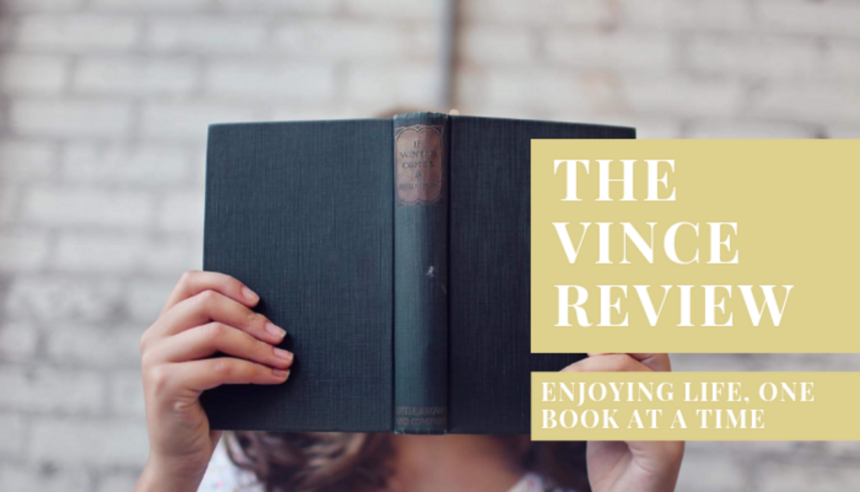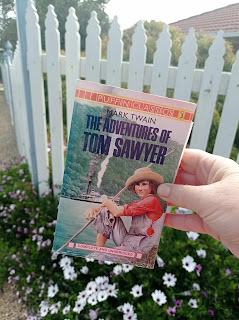I discovered both books comprising Mark Twain's most famous duo in different free street libraries within a short period of time. I've taken that as a sign that it's high time to read them. I say that as a tribute to Mark Twain. It didn't take long to see that his characters themselves are HUGE believers in signs and superstitions within the pages of these novels. Interestingly, it turns out that his birth coincided with the appearance of Halley's Comet, as did his death with its next appearance. And Twain himself predicted that would be the case. 'It will be the greatest disappointment of my life if I do not go out with Halley's Comet. The Almighty has said, no doubt, "Now here are these two unaccountable freaks; they came in together, they must go out together."' Call it coincidence or self-fulfilling prophecy, I'm sure he would have been pleased.
I'm starting with Tom Sawyer and will finish up with Huckleberry Finn soon.
MY THOUGHTS:
I finally read this famous antebellum classic about the mischievous Tom who's such a handful for his long-suffering Aunt Polly. Mark Twain considered it his homage to childhood days and he sure wasn't kidding. At first I was a little apprehensive it would be all beetle races, Robin Hood re-enactments, incantations to recover lost marbles, and cheating to win Sunday school prizes - but then it got interesting and I was hooked. For me, the drawcard begins when Tom and his mate, Huckleberry Finn, witness a grisly grave robbery and brutal murder in a cemetery at midnight, followed by the framing of an innocent man, putting the boys in a fearful moral dilemma.
But that's enough flirting with plot points. I want to focus mostly on character traits. Oh Tom, Tom! He could be called a lovable larrikin, a shrewd businessman (shown by the iconic opening incident with the white picket fence) or an unconscionable, callous little arse! All three are accurate depending on a reader's own starting point. Speaking from a mother's perspective, he crosses a line for me into the third description. The stunt he pulls on poor Aunt Polly, Mrs Harper, and everyone else deserves far more retribution than he ever receives. (It was quite a stunt though, I grant you that!)
Tom's abundant energy and confidence makes him a natural leader, but he uses his imagination to borrow from and cruise by on the genius of others. Tom draws heavily on hackneyed stereotypes he gleans from the stories he loves, and weaves them into play activities for his own gang, who don't have such a broad knowledge base of yarns and legends. So I consider this book to be a tribute to the power and influence wielded by writers and storytellers, as much as it is an ode to childhood. Done well, their stories contain power to shape and inform their culture by hijacking people's enthusiasm, and Mark Twain himself participates in the wonderful ripple effect with this very book.
I tend to think Tom's dynamic combo is an overbearing personality coupled with a vast knowledge and respect for great stories. It gives him an irresistible 'power' persona that covers over many rough edges. And if those are smoothed when he grows up a bit, he probably has a bright future.
But to me, Huckleberry Finn, the town's 'juvenile pariah' provides much of the book's charm. He's the neglected son of a raging alcoholic, hence in the adults' eyes, no fit companion for civilised kids. Although Huck wears cast-off adult clothes, a bit like Dickens' Artful Dodger, he doesn't carry the style off with quite the same panache. There is a certain wistfulness surrounding Huck, who's aware that he's regarded as untouchable by most adults. Yet at the same time, he appreciates being envied by other boys for his freedom from responsibilities such as school and church attendance.
Tom is by far the most gung-ho, cocky member of their friendship group. Huck is his follower, and more cautious and thoughtful in his approach. While Tom revels in being the centre of attention, Huck shuns the spotlight. But he has a courageous core, enabling him to put up with being unwelcome wherever he shows his face. Far from being a bad influence on Tom, it tends to be more the other way around. (Not that I'd go so far as to call Tom a bad influence on Huck, since poor Huck is in need of a true friend.)
Tom's youthful romance gets a fair airing. Becky Thatcher is first presented as 'a lovely little blue-eyed creature with yellow hair plaited in two long tails, white summer frock and embroidered pantalettes.' But far from being as sweet as she appears, Becky is a manipulative little miss, adept at using her feminine wiles for unworthy purposes. Mark Twain appears to have infiltrated the calculating and sometimes tortured headspaces of pre-teen girls, and his accuracy impresses me. The ups and downs of Tom and Becky's relationship indicates precisely why 11 or 12-year-olds shouldn't indulge in love affairs. But perhaps the pair of them deserve to end up with each other in the long run, take that how you will :)
Just because Tom Sawyer himself is heedless and thoughtless doesn't mean we readers have to be. I find the story urges us to ponder the true meaning of success, which may be more modest than we think. Muff Potter, the hopeless drunk, is by all accounts a 'no-account.' Yet his small kindnesses over the years to Tom and Huck may end up saving his life. The boys might not have been as willing to risk their safety to defend someone more like the harsh and exacting school master, Mr Dobbins, who has achieved a far more 'successful' position in worldly terms. (Not that Dobbins would ever find himself in Muff's position, but you know what I mean.)
The book is well worth reading, but we may need to suspend our disbelief. It's not just any old evocation of a southern, small-town world, but one in which the following may happen.
1) Random treasure chests, chock full of coin, may be buried anywhere, so you might as well dig around with your pick and shovel. Your chances of becoming filthy rich are as good as anybody's.
2) Search parties tend to be a bit lame, which you can use to your advantage.
3) Superstitious rituals are generally reliable. When your expectations don't come to fruition, it's probably because witches have interfered.
4) The same two boys may accidentally eavesdrop on the vile plans of the most degenerate wretch they know, not merely once but three or four times. Either together or separately.
I'm right into the goings-on at St Petersburg on the Mississippi now. Bring on The Adventures of Huckleberry Finn. I'm anticipating that Huck, as the main protagonist, will bring a more reflective slant to these rollicking adventures, which may contrast nicely with this book's focus on the impulsive, surface-skimming Tom.
🌟🌟🌟🌟½





